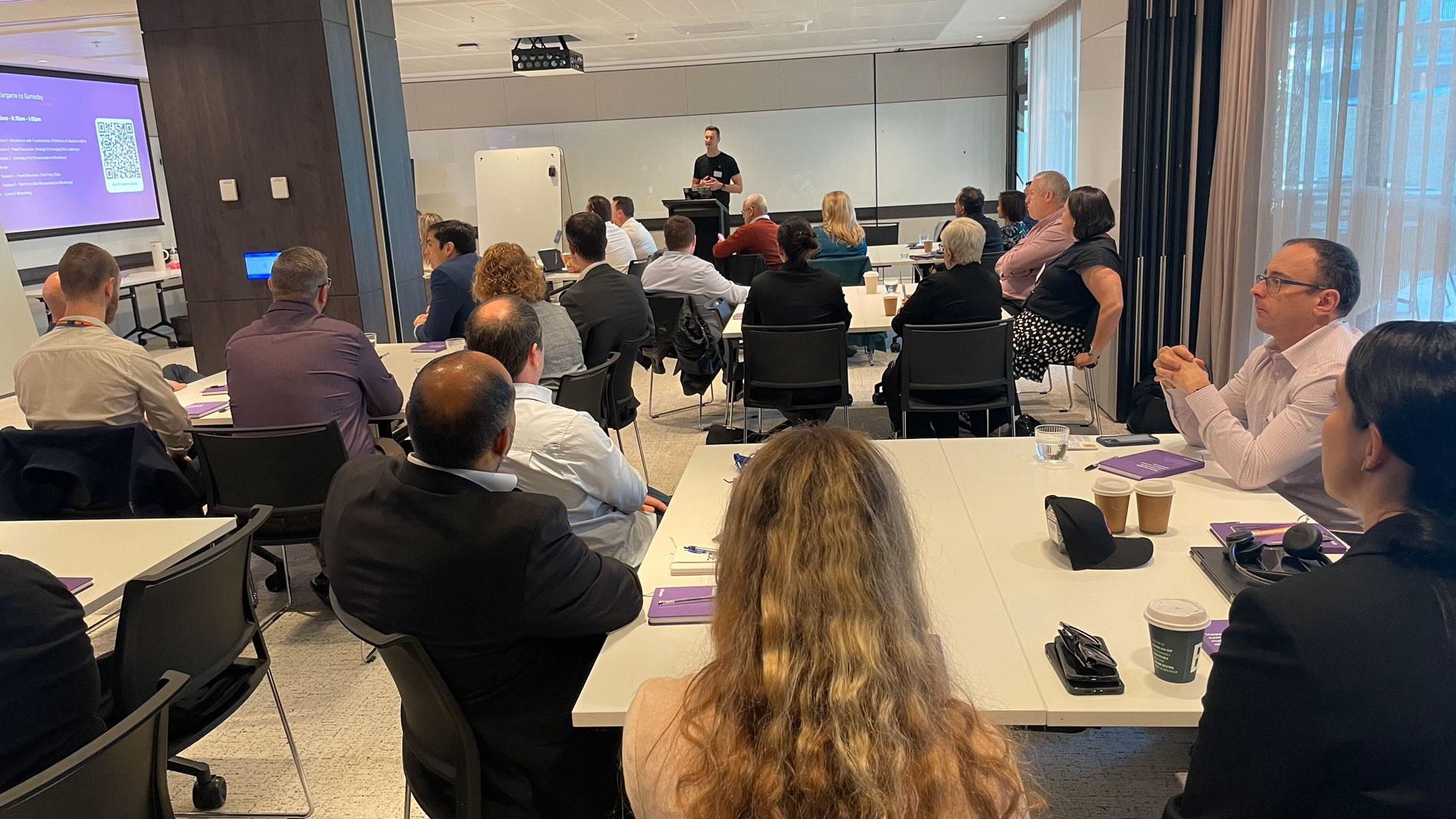
In a world that is hurtling forward at an unprecedented rate of change, organizations are forced to pivot and adapt like never before.
The demand for agility is pressing, as the very essence of organizational resilience is hinged upon the ability to swiftly and strategically adapt to fast moving change. “Bouncing forward” from disruptions is the new mantra.
Wargame to Gameday, Sydney, brought together leaders from various industries across Australia for a day filled with insights into emerging and third-party risks. The audience were engaged through insightful panel discussions and eye-opening AI deep fake and modern slavery microsimulations. Attendees left the event armed with newfound knowledge and strategies to create capability, context, and connectivity in their mission to build ongoing resilience and business agility.
Here’s a recap of the day’s events.
The Strategic & Emerging Risk Landscape

The event commenced with a powerhouse panel discussion featuring iluminr’s Co-founder & CEO, Joshua Shields, QBE’s Head of Emerging Technologies, Alex Taylor, and Control Risks Senior Partner, Mark Shortman. The thought-provoking discussion not only delved into the fundamentals of resilience and business agility, but also uncovered key insights from Control Risks’ Global Resilience Report. Of particular focus was the rise of AI-powered cyber risks, a double-edged sword poised to reshape industries while casting a shadow of looming threats.
Key Insights:
- AI’s transformative potential is marred by the looming threat of AI-powered cyber-attacks.
- Organizations embracing AI must fortify themselves against cyber vulnerabilities, including deep fakes, AI-driven phishing, and automated hacking attempts.
- Prioritizing a holistic understanding of emerging threats, especially those related to AI, is paramount to success. Embrace AI while equipping, educating, and evolving to mitigate risks.
Emerging Threat Microsimulation

To deepen awareness of these emerging threats, attendees were thrust into a deep fake microsimulation workshop.
The scenario unveiled a startling deep fake news clip of a CEO making false statements. Attendees were challenged to envision their response during a “Gameday” scenario, raising questions about roles, responsibilities, and whether the CEO should remain in the room.
This microsimulation underscored the importance of incorporating these severe but plausible scenarios into resilience programs to bolster an organization’s response capability and threat awareness.
Third Party Risks

After a morning tea break, a panel discussion on Third-Party Risks took place. Panelists included iluminr’s Co-founder & Chief Growth Officer, Marcus Vaughan, along with Ben Browne – Executive Manager Technology Resilience & Disaster Recovery, Westpac and Steve Flohr – Executive Manager Enterprise Resilience, NBN Co.
The discussion explored the challenges organizations face when managing third-party risks, emphasizing the need for strong supplier relationships.
Key Insights:
- Managing third-party risks goes beyond contractual agreements and requires a deep understanding of, and relation with suppliers.
- Effective risk management necessitates open communication and collaboration with third and fourth parties.
After all, effective risk management is a team sport, and everyone needs to be engaged in the game.
Third Party Risk Microsimulation

The event progressed with a gripping Third-Party Risk Microsimulation, centered on a critical digital third-party supplier embroiled in modern slavery allegations. Attendees were tasked with assessing the impact of losing a critical application, shedding light on the complexities of ethical dilemmas, reputation risks, and operational challenges.
This microsimulation served as a stark reminder of the multifaceted nature of digital-age risks.
Bringing business agility to life with iluminr

The afternoon session featured iluminr’s platform, which empowers organizations to create resilience and business agility. Joshua Shields stressed the need for agility in today’s dynamic landscape and introduced the resilience flywheel concept, helping organizations create capability, context and connectivity, prerequisites to thrive a world of fast moving change.
The future roadmap presented encompassed personalization, integrations, and automation, all designed to enhance business agility.
Creating Successful Feedback Loops: After Action Reviews

A resilient organization is a learning organization. Attendees were introduced to iluminr’s new feature – Learning Loops. Learning Loops are designed to empower organizations to capture, integrate, and apply learnings from Microsimulations and live response, driving continuous learning at scale and enabling adaptability in today’s ever-changing business landscape.
Leon Israel and Adriana Voegeli from iluminr provided insights from diverse industries that helped shape the design of Learning Loops, and standardize an organization’s approach to gathering insights to continuously optimize their decision-making processes.
Building Engagement: Successfully deploying Microsimulations

iluminr’s Customer Success team – Julian Keil and Rachael Fisher delivered a session on “Building Engagement with Microsimulations”, exploring the role of engagement in agility building. Deliberate practice and the High-Octane Model were introduced as strategies for creating muscle memory and developing skills effectively.
Attendees learned that microsimulations are more than just exercises; they are opportunities to create real engagement, enhance threat awareness and build response capability from the shop floor to the board room.
Playbooks: The Future of Planning

The final session facilitated by Leon and Julian, delved into the role of playbooks in response planning and their importance in adaptive response connectivity. Key considerations for designing playbooks were discussed, including trigger mechanism, response adaptation and personalization.
As considerations and steps for designing playbooks were outlined, a quick scan of the room showed attendees mentally mapping out how to apply these strategies in their own organizations.
In closing
Are you interested in learning more about our Wargame to Gameday series? Visit us at iluminr.io to learn how to bring Wargaming to Gameday to life at your organization.














